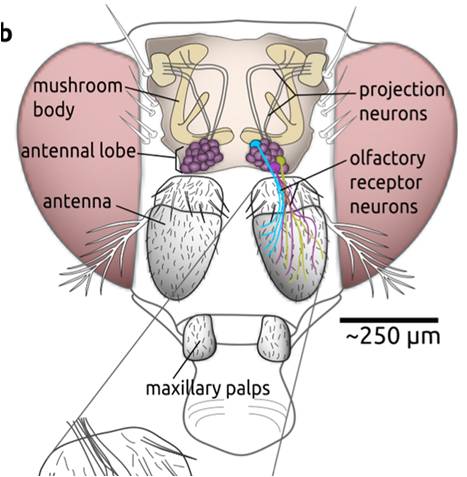New research published in Science Reports by Strauch et al., shows that fruit flies can tell the difference between cancerous and healthy cells. The researchers recorded calcium patterns indicative of neuronal activity that was stimulated in response to various odors emitted by healthy and cancerous cells. Because cells with cancer differ metabolically from healthy cells, they emit different volatile compounds that can be detected by olfactory receptor neurons on the antennae of fruit flies. When exposed to breast cancer cells or healthy cells, the flies exhibited different patterns in neural activity indicating the flies could distinguish between the cell types. According to the study authors, the ultimate goal is to develop "electronic nose" biological sensors that can detect cancer.
Source:
Strauch M, Ludke A, Munch D, Laudes T, Galizia G, Martinelli E, Lavra L, Paolesse R, Ulivieri A, Catini A, Capuano R, Dr Natale C. More than apples and oranges - Detecting cancer with a fruit fly's antenna. Science Reports. 4:3576 (doi:10.1038/srep03576)


Although this research exists to be rather interesting. I have a difficult time believing it to be true. As a student hoping to pursue a career in the medical field with an emphasis on the brain and having taken many courses about cells, whether malignant or benign and learning a lot about the brain, I do not find it plausible for a fruit fly to be able to determine whether or not something is cancerous. Cancer is not something that can simply by determined by a scent, otherwise it would have been prevented in many cases of cancer patients. The longevity of a fly alone would keep my from believing they can distinguish between cancerous and non-cancerous substances. They indeed have strong sense of smell but with a brain the size 20 micrometers and with cancer being something a human has a difficult time discovering, odds are this research holds to be impossible. The fact that cancer can be detected through an antennae seems absurd when it takes months and years to detect it under a single microscope using a small sample. I am interested in hearing more about this research and will definitely look into it further when I continue into medical school to study the brain and cancer or pathogens. Because although I find it to be false, it is incredibly interesting to consider.
I have read a couple of articles pertaining to the ability of animals to "sniff out" cancer. There are studies that suggest that bees and dogs can also detect the cancerous cells, and not just fruit flies. Since animals have a far greater ability to pick up different scents, I cannot say that I think that this is impossible, The only thing I do not fully understand is how scientists can track the neuronal activity of something as small as a fruit-fly,
Natasha Pieterse 14030676
This is a very interesting topic and is definitely something to investigate further. The concept of using what we observe in nature to help us to improve our lives is not new and there are many examples of how observing the natural world has helped us to discover how to do things more effectively in our lives. For example when you look at the wings of a new airplane you can notice that the tips are bent upwards at an angle. This innovation came form observing the flight patterns of eagles and this wing formation helps to stabilize the airplane in flight. Just as in this case we can use what we observe in nature to possibly create a device that can detect cancer as easily as a dog can smell if you have food in your pocket or not . This would be a great benefit to human society as patients whose cancer is detected early have a far greater chance of survival as well as a greater chance of less treatment required and longer life expectancy.
This is indeed an interesting topic and I believe that - if this concept is developed and proved to be successful- the use of fruit flies are just the beginning of the solution of numerous biological and medical obstacles. I have read that researchers at the Duke University claims that fruit flies can even aid people with brain damage. They state that the fruit flies can regenerate new neurons and lose the neurons they do not need during metamorphosis. Further research is being done to determine whether this ability of the fruit fly can be replicated to initiate the creation of new neurons in the damaged brain; as for the human brain can not regenerate damaged neurons. So as impossible as it may seem that fruit flies can detect cancer cells, I however believe that it is possible, even though I also do not understand how scientists can detect the neuronal activity of a fruit fly. But with our advanced technology, intellect, creativity and a little bit of hope, it can be done.